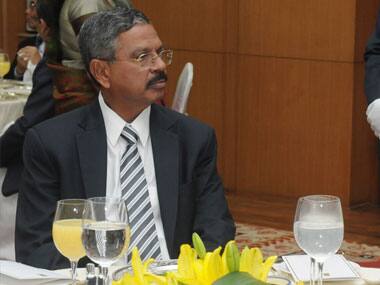Chief Justice HL Dattu has precipitated a needless constitutional crisis by refusing to head the three-member panel to select two eminent persons to be part of the National Judicial Appointments Commission (NJAC), which has the mandate to select and transfer judges. In doing so, the CJI has effectively defied the law as it stand today - a law backed by a constitutional amendment in parliament and passed by 20 states. The Chief justice has not onlly created a crisis between executive and judiciary, but - worse - effectively flouted the law and the will of the people. [caption id=“attachment_2216202” align=“alignleft” width=“380” class=" “]  CJI HL Dattu. Image courtesy: PIB[/caption] It can be argued that since the constitutionality of the NJAC is now under challenge, the CJI had a good reason to put off compliance till the five-judge bench hearing the issue takes a final view. This won’t wash for the simple reason that as long as a law is on the statute book, nobody has a licence to defy it. Not even the CJI. As the primary upholder of the law, the CJI should know that a law is legally valid unless it is amended or struck down or temporarily held in abeyance by a judicial stay order. Since none of these three situations exists with respect to the NJAC, CJI Dattu is in contravention of the law. The bench hearing the case has to direct him to join the NJAC panel as per law. An analogy will explain the situation better. Section 377 of the Indian Penal Code, which criminalises homosexuality, was the law of the land till a high court declared it invalid. Since the Supreme Court, in its wisdom, over-ruled the high court verdict, it is the law once more. Let us be clear: section 377 is an abomination and violative of the fundamental rights of citizens and is thus worth overturning. But as long as it is the law it has to be followed. The same logic holds for the NJAC law, unless it is struck down by the Supreme Court bench. The NJAC Act abolishes the collegium system of judges appointing themselves and replaces it with a six-member NJAC headed by the Chief Justice of India. It is possible that the Supreme Court bench may find parts of the NJAC law impinging on the independence of the judiciary, and could strike these parts down. But the collegium system stands abolished anyway unless the bench decides that it will be restored in defiance of the will of parliament and the people. But this is unlikely for the objective fact is that the collegium system itself was never part of the original constitutional mandate, which only required the President (ie, the government) to consult the CJI and appoint judges to the higher courts. It was the collegium that was truly unconstitutional. The NJAC restores the intent of the original constitutional provisions by giving the executive some say in the appointment of judges. But even in the NJAC it is the judicial nominees who dominate. Three of the six members of the NJAC are judges, and two eminent persons are to be added by a three-member panel headed by the CJI, the PM and the leader of the opposition. It is this panel that CJI Dattu has refused to join. The law minister is the only member of the executive on the NJAC. The only weak point in the NJAC law is the prospect of executive and judiciary members meeting too often, and thus creating the possibility of a nexus, compromising the independence of the judiciary. This can be easily remedied by making the chairmanship go to the immediate past CJI - thus insulating the sitting judiciary from excessive exposure to the executive. That leaves the question: why should the executive have any say at all in judicial appointments? The answer is two-fold. First, only parliament has the mandate to make laws, and since these laws will be adjudicated by the courts, who is to courts appointed matters. In the US, all Supreme Court appointments are cleared by Congress. Second, the above point would not matter if courts had restricted themselves only to an interpretation of the law. But India’s higher courts have gone well beyond their basic mandate by getting deep into executive domain - chasing black money, ordering changes in policy, and even imposing their version of what is good for the country (cleaning the Ganga, imposing the use of CNG in buses, etc). Balancing this judicial over-reach means giving the executive some say in judicial appointments. CJI Dattu should not defy the NJAC law. If judges cock a snook at the law, however flawed in their opinion, how can they expect ordinary citizens to follow it? The CJI has set a bad precedent. The bench should uphold the law.
Dattu has precipitated a needless constitutional crisis by refusing to head the three-member panel to select two eminent persons to be part of the NJAC, which has the mandate to select and transfer judges.
Advertisement
End of Article
Written by R Jagannathan
R Jagannathan is the Editor-in-Chief of Firstpost. see more


)

)
)
)
)
)
)
)
)



